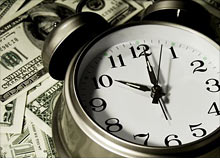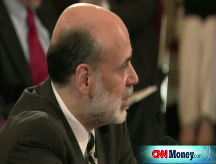Poll: Small-biz owners down on economy, working longer hours
Higher prices, smaller staffs and longer hours are just a few of the changes the economic slump has prompted at small companies

(Fortune Small Business) -- The good news: The economy is not as bad as it was in the early 1980s, when unemployment hit 10% and the inflation rate touched the double digits. The bad news: A lot of small business owners think it is.
Pessimism about the economy among small-business owners has reached lows similar to those experienced from 1980 to 1982, the nadir of the worst recession in modern economic history, according to the latest installment of Small Business Economic Trends Report by the National Federation of Independent Businesses (NFIB), often dubbed "the optimism index." The current optimism index is 89.2, the lowest since 1986.
"Clearly, conditions aren't good," said William Dennis, senior research fellow at the NFIB Research Foundation, of the current economy. "But there's a considerable difference between the conditions themselves [in 1980 versus 2008]. It was much, much worse in 1980. What sent the index down really has to do with just a general mood."
Rising gas prices, the subprime lending crisis, and repeated federal bailouts of struggling financial giants have exacerbated that mood, as political candidates and the media focus on the widespread economic distress.
The slumping economy's affect on small businesses is reflected in several key statistics from the NFIB's latest Small Business Poll, which was released on Monday.
Forty-four percent of small-business owners surveyed said they're spending more time working for their business than they did six months ago, with 41% attributing the extra workload to a slowing economy. But 10% of respondents said they're spending less time on business, because the downturn leaves them with less work to do.
Nearly half of surveyed business owners said that their selling prices were "a little higher" or "a lot higher" than they were six months ago. Of this group, a majority - 65.7% - blamed higher costs. Twenty-one percent of respondents have fewer employees than they did six months ago, with 70% citing slower business activity as the cause.
But in general, the study suggests that the actions small-business owners have taken are "modest precautions...neither abrupt nor drastic," Dennis said. "I was surprised by the degree to which people for the same reasons take very different actions."
For instance, 20% of respondents said they are advertising their business more than they were six months ago, but 15% said they are marketing less - with both groups citing the slowdown as their primary motivation.
Twenty percent of those polled said they had scaled back within the past six months on planned capital investments, largely because the slowing economy made the investments inadvisable. (Five percent said they could not get financing for their plans.) However, 30% said they remained on track with their plans for major purchases.
The NFIB poll, conducted by the Gallup Organization in March 2008, involved interviews with 750 small-business owners across the country with staffs of 249 employees or fewer.
One significant change the poll picked up: Entrepreneurs are paying closer attention than they ever have before to the Federal Reserve Board. Three out of four small business owners polled said they have followed the activity of the Fed to some degree over the past six months, with 33% saying they've closely watched the board's moves. Thirteen percent of respondents said they had made business decisions in direct response to the Fed's actions.
"If you go back twenty years, to 1980 to 1981, and you asked people 'have you been following the Fed?,' the answer would have been 'who?'" Dennis said. "[This] reinforces the idea that the small-business public is getting the notion that this is where economic decisions are made in the country." ![]()
Stimulus made no difference, small-biz owners say
Businesses brace for minimum wage hike
Fed: Slow growth, rising prices hurt economy
-
The Cheesecake Factory created smaller portions to survive the downturn. Play
-
A breeder of award-winning marijuana seeds is following the money and heading to the U.S. More
-
Most small businesses die within five years, but Amish businesses have a survival rate north of 90%. More
-
The 10 most popular franchise brands over the past decade -- and their failure rates. More
-
These firms are the last left in America making iconic products now in their twilight. More











